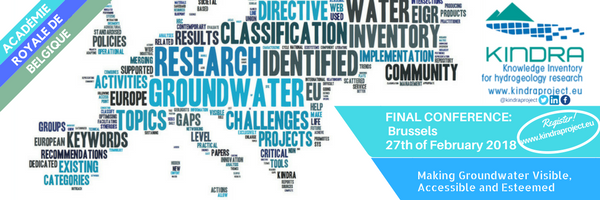
KINDRA Final Conference
KINDRA Final Conference
Making Groundwater Visible, Accessible and Esteemed
Date:
27th of February 2018
Venue:
Académie Royale de Belgique, Rue Ducale 1, 1000 Bruxelles, salle Prigogine
Organizers:
KINDRA consortium, https://eurogeologists.eu/kindra-final-conference/
Background:
Groundwater and hydrogeology-related research activities cover a wide spectrum of research areas at EU and national levels. However, groundwater issues are quite often either ignored or considered only in insufficient detail and separated from the associated surface water bodies, despite of its critical importance as renewable, high-quality, naturally protected (but still vulnerable) resource that has significant impacts on both surface water bodies and ecosystems. The KINDRA project (Grant Agreement No. 642047, www.kindraproject.eu) created a critical mass for scientific knowledge exchange of hydrogeology research, to ensure wide applicability of research results, including support for innovation and development. The overall objective of the project is to take stock of our current knowledge of hydrogeology through an inventory of research results, activities, projects and programmes at national and international scale.
Aim:
The final conference is aimed to communicate the results achieved by the project, from the new classification system, to the inventory of hydrogeological products (EIGR) and its content of more than 2000 metadata, to be used for evaluating the state-of-the-art of European research & knowledge on groundwater. Results of inserted data have been critically analyzed, to identify modern challenges, trends and gaps in groundwater science and practice. Obtained results need to be discussed with institutions, associations, stakeholders and decision makers, with the aim to identify a road map for developing policies, strategies, and management options at European level, able to highlight and correctly evaluate the importance of groundwater for both human requirements and environmental needs, in the framework of the circular economy, the water-food-energy nexus, the zero-waste goal, the sustainable development goals and the optimization of natural resources.
